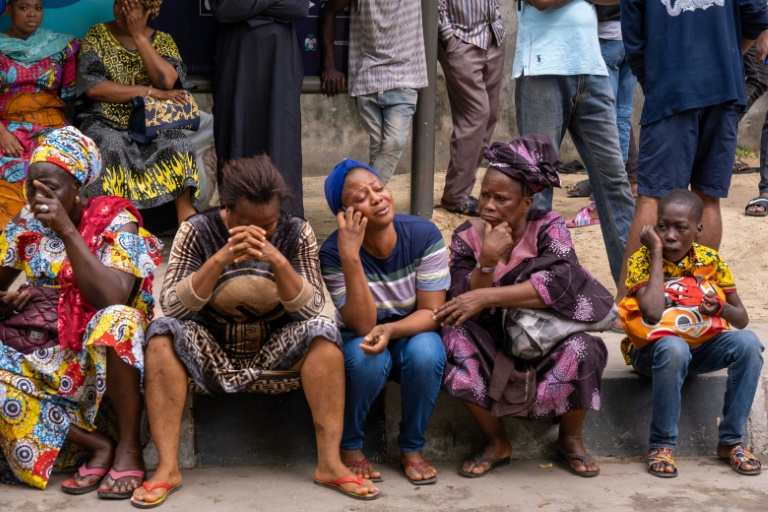The death toll from a collapsed high-rise building in Nigeria’s Lagos climbed to 22 on Wednesday, emergency services said, as hope dwindled for survivors two days after the incident.
Families and friends of people trapped in the rubble were waiting at the scene as rescue operations continued after the 21-storey building crumbled on Monday in the upscale Ikoyi neighbourhood.
“We recovered two male bodies early this morning, bringing the toll to 22,” Ibrahim Farinloye of the National Emergency Management Agency told AFP.
The number of survivors still stood at nine, he said, adding that search operations were still on as dozens more are feared missing.
“This is an event that could be described as a terrible national disaster,” Lagos State Governor Babajide Sanwo-Olu said during a visit to the site Wednesday.
Police said it was too early to determine why the building, which was still under construction, had collapsed.
“Mistakes were made from all angles,” the governor said.
Sanwo-olu said Tuesday he was setting up an independent panel to probe “the remote and immediate causes of the incident and make recommendations on how to prevent future occurrence.”
“We will give them 30 days to wrap up” the probe, he added.
Two other smaller buildings in Lagos also collapsed on Tuesday following heavy rains in the densely populated city of about 20 million people a day earlier, though no one was killed, emergency service official Farinloye said.
Building collapses are tragically common in Lagos and across Africa’s most populous nation, where substandard materials, negligence and a lack of enforcement of construction standards are major problems.
– ‘Made their decision already’ –
Distraught relatives and friends of the victims have been waiting at the scene since Monday, seeking information on their fate.
Damilola Otunla, 29, sat on the pavement across the street on Wednesday pursuing a three-day vigil for her brother Bob-Oseni Wale, 50, believed to have been inside the building when it collapsed.
When she heard news of the disaster on Monday, she immediately rushed to the scene from her home in neighbouring Ogun state.
Wearing the same grey hoodie, black shorts and flip flops since Monday, Otunla looked sad, her eyes empty, as she recalled how her much older brother had acted like a father.
“He took me in like his own daughter,” she added.
Her brother lives in the US state of Maryland but had been home for the past few months and was visiting a friend working on the building site, she said.
He was meant to fly back on Monday when the tragedy happened.
She was angry with the slow pace of the daily rescue efforts, which on Wednesday had not started as of 8:30 am.
“It is like they have made their decision already,” she said.
– ‘Retrieval operation’ –
A friend of another victim who did not want to be identified “because it won’t change anything”, said that “what they are doing is a retrieval operation not a rescue operation”.
But emergency service official Farinloye said that rescuers “won’t give up until we reach ground zero,” adding that bigger equipment was brought in Tuesday evening for the operation.
“We’re still very hopeful,” Governor Sanwo-Olu said, explaining that water and oxygen were being inserted into the pile of debris, in case it could help any survivors.
“We don’t know how long it is going to take, but we can assure you that we have enough resources… to take as long as it takes,” he assured.
The number of people present on the site at the time of the collapse is still unknown, he added.
In one of Nigeria’s worst building disasters, more than 100 people, mostly South Africans, died when a church guesthouse crumbled in Lagos in 2014.
An inquiry found the building had been built illegally and had structural flaws.
Two years later, at least 60 people were killed when a roof fell on a church in Uyo, the capital of Akwa Ibom state, in the east of the country.










